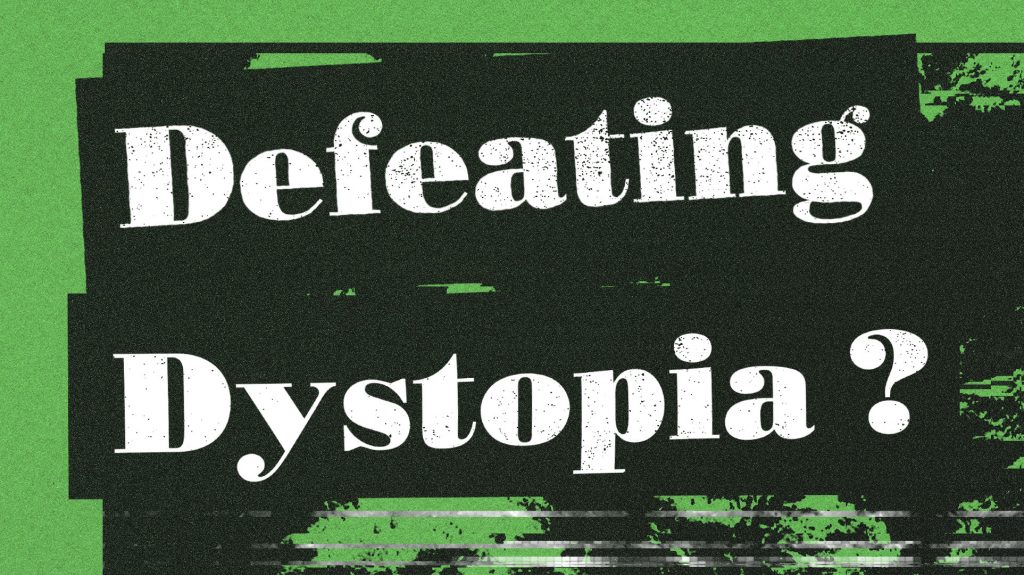2.Dh5 Festival 1-2 februari Utrecht: Defeating Dystopia
De veertiende editie van het jaarlijkse 2.Dh5 Festival komt in februari 2020 naar BAK, basis voor actuele kunst, Utrecht, met dit jaar het thema ‘Defeating Dystopia?’. (English at bottom)

Er vindt een verregaande ontwrichting in de maatschappij plaats als gevolg van ecologische, economische en sociale crises en de extreemrechtse en techno-dystopische reacties hier op. Je zou kunnen stellen dat voor verdrukten en geëxploiteerden de huidige realiteit al een dystopie is. Dit neemt niet weg dat als huidige trends zich doorzetten, zoals lijkt te gebeuren, deze situatie alleen maar zal verergeren.
“The probability of apocalypse soon cannot be realistically estimated, but it is surely too high for any sane person to contemplate with equanimity.” ― Noam Chomsky
Betekent het onder ogen zien van deze realiteit dat we onze hoop voor een vrije en solidaire wereld moeten opgeven? Raymond Williams schreef: “To be truly radical is to make hope possible, rather than despair convincing.” Maar is het niet naïef om nog vast te houden aan hoop, als we onze huidige machteloosheid om iets fundamenteels aan de omstandigheden te veranderen erkennen? Is de droom van ‘een andere wereld is mogelijk’ niet precies dat: een droom? Moeten we misschien op zoek gaan naar een nieuwe manier om door te vechten en onze waardigheid te behouden? De toekomst recht in de ogen durven kijken om de afgrond in te scheeuwen: “Kom maar dan!”?
“Well of course I get depressed sometimes, yes I do.” ― Angela Davis
Soms kan dit machteloze gevoel overweldigend worden en verlammend werken. Dit willen we juist voorkomen door samen te komen om dit collectief bespreekbaar te maken en het taboe te doorbreken. We hopen dat dit een bevrijdende werking heeft en ons inspireert om samen de strijd door te zetten.
Want als er ergens hoop te vinden is het wel in verzet. In de strijd. Juist daar zijn prefiguraties van een radicaal andere toekomst en vluchtige verschijningen van utopieën te vinden. Ook heeft zeker niet iedereen de hoop opgegeven. Van de hernieuwde interesse in afrofuturisme tot ideeën van de commons, post-work en zelfs ‘fully automated luxury communism’; hoopvolle ideeën genoeg.
Naast het thema ‘Defeating Dystopia?’ zullen er zoals gebruikelijk enkele tientallen workshops, discussies en lezingen plaatsvinden over strategieën en inhoudelijke verdieping rondom feminisme, queer, antiracisme, antifacisme, dekolonialisme, arbeidsstrijd, antimilitarisme, internationale solidariteit, milieustrijd, migratie/no-border, internet vrijheid/privacy, recht op stad/anti-gentrificatie en/of alle kruisingen daartussen.
Frantz Fanon schreef: “Each generation must, out of relative obscurity, discover its mission, fulfill it, or betray it.” Ondanks alles zijn wij de generatie die de uiteindelijke impact van de huidige crises zullen bepalen. Laten we bij deze editie van 2.Dh5 hier samen naar op zoek gaan.
Het festival vindt plaats bij BAK, basis voor actuele kunst in Utrecht, een basis voor kunst, kennis en het politieke. Het vormt onderdeel van de serie BAK, basis voor…, waarin BAK de samenwerking aangaat met andere initiatieven en organisaties, om zo vanuit gedeelde maatschappelijke urgenties voorstellen te doen voor andere vormen van samenzijn: “being together otherwise”.
————– English
The fourteenth edition of the yearly 2.Dh5 festival is coming to BAK, basis voor actuele kunst in Utrecht in February of 2020, with the theme “Defeating Dystopia?”
Society is being disintegrated by ecological, economic and social crises and the extreme right and techno-dystopian reaction to these developments. For the oppressed and exploited our current reality is already a dystopia. Nonetheless, if current trends continue, as seems to be the case, this situation will only deteriorate further.
“The probability of apocalypse soon cannot be realistically estimated, but it is surely too high for any sane person to contemplate with equanimity.” ― Noam Chomsky
Does this realisation mean we should toss aside our hopes for a free and caring world? Raymond Williams wrote: “To be truly radical is to make hope possible, rather than despair convincing.” But is it not naive to hold on to hope when we acknowledge our current powerlessness to change anything fundamental about our trajectory? Is the dream that ‘another world is possible’ not exactly that: a dream? Should we not be looking for a new way to continue the struggle while retaining our dignity? Look the future straight in the eye and scream into the abyss: “Bring it on!”?
“Well of course I get depressed sometimes, yes I do.” ― Angela Davis
At times, this feeling of powerlessness can become overwhelming and paralysing. We aim to prevent this by tackling this feeling head-on and discussing it collectively, to break open the taboo that surrounds it. We hope this will have a liberating effect, and inspire us to continue the struggle, no matter the odds.
Because if there is hope to be found, we will find it in resistance. In the struggle. It is there that prefiguration of radically different futures and fleeting utopias take shape. Besides, far from everyone has given up hope. From renewed interest in Afro-futurism to the commons, post-work and even fully automated luxury communism; hopeful ideas abound.
Next to the theme “Defeating Dystopia?”, the festival will host several dozen workshops, discussion and talks about strategies, in depth exploration and action around feminism, queer, anti-racism, anti-fascism, de-colonisation, anti-militarism, international solidarity, climate/ecology, labour & class struggles, migration/no-border, internet freedom/privacy, right to the city/gentrification and all their intersections.
Frantz Fanon wrote: “Each generation must, out of relative obscurity, discover its mission, fulfill it, or betray it.” Despite everything, we are the generation that will determine the impact of the current crises. Let’s use this edition of the 2.Dh5 festival to figure out how to make this change.
The festival will take place at BAK, basis voor actuele kunst in Utrecht, a base for art, knowledge, and the political. It is part of the program series BAK, basis voor…, in which BAK join forces with other organizations in addressing shared urgencies and developing propositions for a future of “being together otherwise.”